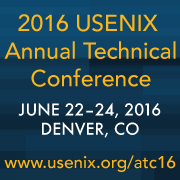sponsors
help promote
usenix conference policies
Erasing Belady’s Limitations: In Search of Flash Cache Offline Optimality
Yue Cheng, Virginia Polytechnic Institute and State University; Fred Douglis, Philip Shilane, Michael Trachtman, and Grant Wallace, EMC Corporation; Peter Desnoyers, Northeastern University; Kai Li, Princeton University
NAND-based solid-state (flash) drives are known for providing better performance than magnetic disk drives, but they have limits on endurance, the number of times data can be erased and overwritten. Furthermore, the unit of erasure can be many times larger than the basic unit of I/O; this leads to complexity with respect to consolidating live data and erasing obsolete data. When flash drives are used as a cache for a larger, disk-based storage system, the choice of a cache replacement algorithm can make a significant difference in both performance and endurance. While there are many cache replacement algorithms, their effectiveness is hard to judge due to the lack of a baseline against which to compare them: Belady’s MIN, the usual offline best-case algorithm, considers read hit ratio but not endurance.
We explore offline algorithms for flash caching in terms of both hit ratio and flash lifespan. We design and implement a multi-stage heuristic by synthesizing several techniques that manage data at the granularity of a flash erasure unit (which we call a container) to approximate the offline optimal algorithm. We find that simple techniques contribute most of the available erasure savings. Our evaluation shows that the container-optimized offline heuristic is able to provide the same optimal read hit ratio as MIN with 67% fewer flash erasures. More fundamentally, our investigation provides a useful approximate baseline for evaluating any online algorithm, highlighting the importance of comparing new policies for caching compound blocks in flash.
Open Access Media
USENIX is committed to Open Access to the research presented at our events. Papers and proceedings are freely available to everyone once the event begins. Any video, audio, and/or slides that are posted after the event are also free and open to everyone. Support USENIX and our commitment to Open Access.
author = {Yue Cheng and Fred Douglis and Philip Shilane and Grant Wallace and Peter Desnoyers and Kai Li},
title = {Erasing {Belady{\textquoteright}s} Limitations: In Search of Flash Cache Offline Optimality},
booktitle = {2016 USENIX Annual Technical Conference (USENIX ATC 16)},
year = {2016},
isbn = {978-1-931971-30-0},
address = {Denver, CO},
pages = {379--392},
url = {https://www.usenix.org/conference/atc16/technical-sessions/presentation/cheng},
publisher = {USENIX Association},
month = jun
}























connect with us